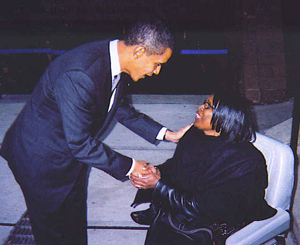Jackie Jackson, disabled by multiple sclerosis, empowers others with disabilities to seek inclusion

Disease weakened her muscles and left her unable to walk by her mid-30s.
But Jacqueline “Jackie” Jackson kept on moving.
Indeed, Jackson, who earned her Master of Social Work degree from Rutgers in 2005, has made so many contributions to her field that this spring she was was named National Social Worker of the Year by the National Association for Social Workers, becoming the first person from New Jersey to win this award. The organization's local New Jersey chapter also named Jackson as its 2010 Social Worker of the Year.
“From a very young age, I knew I always wanted to help others,” says Jackson, who is 52 and confined to a wheelchair. “I want to be the voice for those who don’t have one."
Jackson, who battles sarcoidosis, multiple sclerosis, and fibromyalgia, admits she’s not without difficult days. But her disability propels her forward.
“When she was chosen as [state] social worker of the year, she immediately contacted me and asked what she could do to help us as the awardee,” says Mary Jean Weston, assistant executive director of NASW’s New Jersey chapter. "That’s never happened before. Jackie always goes above and beyond what is asked of her.”

That attitude was essential when Jackson was forced into early retirement because of her disabilities. Until that time, Jackson, a single mother of two children and primary caregiver to her niece and nephew, had worked full time for 18 years at the University of Medicine and Dentistry of New Jersey as a secretary, ophthalmic assistant, and a residency coordinator.
Since retirement is not a word in Jackson’s vocabulary, she decided to pursue her education. Jackson entered Rutgers University in 1986 and earned her bachelor’s degree in Africana studies, then completed her master’s degree at the School of Social Work.
To say she made an impression on her professors would be an understatement.
“Jackie has proven to be one of the most remarkable human beings and social workers I have ever known,” recalls V. DuWayne Battle, director of the Rutgers undergraduate social work program, who had Jackson in class.
Jackson credits Battle’s "Diversity and Oppression" course for helping her develop her platform to showcase what it means to be culturally diverse to others.
Rutgers was always in her corner, she said. “Whenever I encountered an academic or architectural barrier, they supported me in my efforts to rectify it,” explains Jackson. “They were extremely inspired when I advocated for the heavy manual doors at Beck Hall to be replaced with an automatic door."
Jackson also advocated for additional handicapped parking spaces and rest rooms.
Following graduation, Jackson naturally combined her undergraduate and graduate degrees when she began reaching out to African-American churches in Somerset, Essex, and Middlesex counties, where she speaks about inclusiveness for those of all faiths living with disabilities.
She also challenged elected officials to spend one day in her shoes – or wheelchair – on one of her accessibility tours. Jackson took elected officials on tours of their facilities to show them the daily obstacles faced by people with disabilities.
Her accessibility tours have gotten results. “I recall once that I couldn’t get into the Franklin town hall for meetings because I couldn’t open the doors,” Jackson says. “Mayor Brian D. Levine showed a lot of empathy and almost immediately installed automatic doors.”
Jackson’s advocacy work continued to spread. She partnered with the Metro Chapter of the Multiple Sclerosis Society to conduct accessibility tours of the New Jersey State House last year.
And Jackson was invited to the White House last July, with the National Multiple Sclerosis Society, as President Obama signed an executive order increasing federal employment of individuals with disabilities, during an event commemorating the 20th anniversary of the Americans with Disabilities Act.
She is also an inspiration to the next generation of up and coming social workers.
“Jackie will never let an obstacle or a problem keep her down for long,” says Sarah Getz a social work major at the University of Maryland who worked with Jackson while interning last summer at the NASW-NJ. “I can only hope that one day I will be half the social worker, and the person, that Jackie Jackson is today.”
Even now, there is no slowing down for Jackson.She is pursuing a Masters of Divinity degree at the New Brunswick Theological Seminary. Her goal is to pursue a doctoral degree with a focus on church and community.
In five years Jackson hopes to be known as the Rev. Jackie Jackson, as she continues to empower those with disabilities to seek full inclusion in society. “I strongly believe that by educating society about people with disabilities, we will assist with eliminating discrimination,” she says.